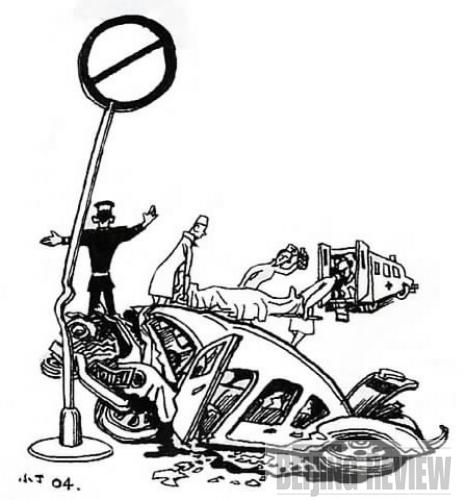|
"I have always thought I am just an ordinary person who is nothing special," Ding always said.
He also liked others calling him Little Ding, as in this way he thought he was still young and energetic.
Actually, in the memories of his friends, he was always young. His black hair and vigor were always what impressed his friends most. But people know that the main reason he kept young at heart was his positive attitude to life.
Indeed, Ding experienced many setbacks in his life. In 1957, Ding was labeled as a "rightist" during the notorious "anti-rightist movement," and was banished to the remote areas of China's northeast. It was not until 1979 that Ding was allowed to paint again.
However, such unfair treatment did not water down his passion for life and art. He got over the hard times through willpower and an optimistic attitude.
"He never gave up his ideals and the courage to fight against the bad social phenomena," said Chen Siyi, who wrote satirized words matched with Ding's cartoons for Reading, in an article commemorating Ding on Sina.com. "Nothing could defeat his fighting spirit."
Golden period
When he resumed the freedom of painting later, Ding cherished every second, trying to make up the time that he had lost. Then in his late years, he entered another golden period.
Shen Changwen, former Editor in Chief of Reading (Ding joined the magazine at the age of 63), said that Ding worked very hard and had no complaints. "Readers knew that he contributed cartoons for the magazine, but they did not know that Ding was also in charge of the layout for every issue," Shen said, adding that Ding was always willing to help anyone in need. "We called him a model worker," said Shen.
The passing away of Ding was a great loss to the Reading magazine, said Wu Bin, Executive Editor of the magazine. "Ding was like a forest that supports the younger generations of the magazine," she said. She thinks that the remarkable accomplishments Ding made in the art field were the result of his sense of humor and upstanding personality. "No matter in complimenting or in satirizing, he would always find materials for his drawings everywhere at any moment," she added.
Although Ding was famous for his cartoons, he was a kind old man in the eyes of people around him. Wang Meng, a famous Chinese writer who was a fan of Ding's cartoons and also invited Ding to draw a portrait for him, told Xinhua that Ding was simple and sincere and had a heart filled with love. "No matter what genre, his works would bring a pleasant feeling to readers. Even through the sharply critical works, readers would feel the simplicity of humanity and the humor the artist tried to convey," Wang said.
Most of Ding's friends remember him as a humble man, who never stood on ceremony. "He just wanted the fans of his cartoons to appreciate his works and didn't like formality," said a friend of his in an article on Sina.com.
He stayed true to this character until the last minute of his life. Shen Jun, his wife, told reporters that Ding had said that he wanted no formal ceremony after his death and that all the funeral affairs should be done in a simple way.
"He said that he felt very happy to do one thing in his life, which was drawing cartoons," said Shen. That might be the most accurate description about the challenging and extraordinary life of this cartoonist.
 |
|
FAME: Scholars opt for recognition rather than academic merit in this cartoon by Ding (XINHUA) |
 |
|
RECKLESS: This cartoon satirizes bad driving habits (XINHUA) |
| 